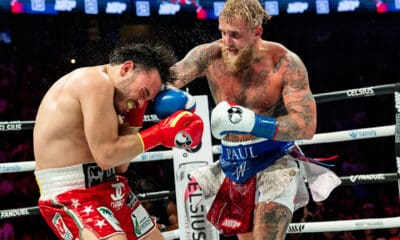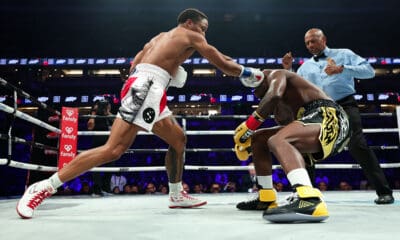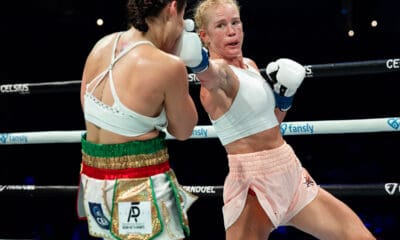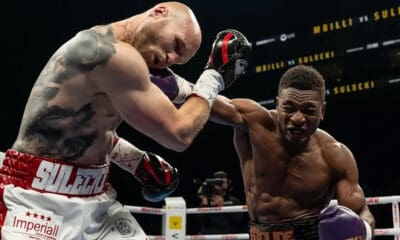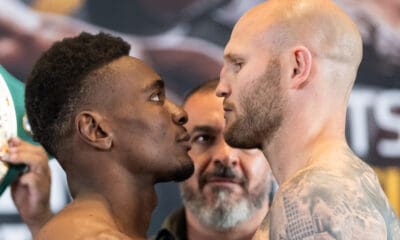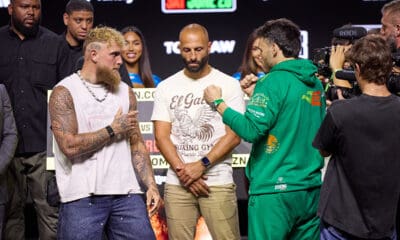There are two ways to look at this latest (and possibly final) installment of the Rocky cinematic legacy: You can see it as the third film of the Creed trilogy, or you can see it as the ninth film of the Rocky Balboa series. Either way, what has become clear with Creed III is that this remarkably durable series of films no longer belongs to Sylvester Stallone, it belongs to Michael B. Jordan. In fact Sylvester Stallone’s iconic character is not seen in the film, nor is his absence explained. And you know what? It doesn’t matter.

Michael B Jordan deserves loud praise for the all around work on Creed III
Jordan bit off a lot with Creed III. As the star, producer, and as a first-time director, the success or failure of the film weighed entirely on his shoulders. It pleases me to no end to state that Jordan has clearly been paying attention during all his years on film sets, because Creed III isn’t just competently told, it’s often inspiring, moving, and even topical in how it manages the subject of childhood trauma—particularly as it relates to black boys.
You can sense how confident Jordan must have been by casting the fabulous Jonathan Majors as his adversary. Jordan clearly wanted an actor who could both hold the screen and challenge him. Considering how many hats Jordan was wearing during the making of the film, it’s more than admirable that he chose an actor of Majors’ ability to face off against.
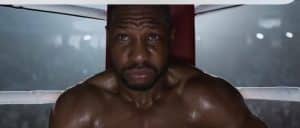
Creed’s rival, played by Majors, succeeds at coming off as a nasty (and skilled) badass
And boy, does Majors ever deliver as Damian “Dame” Anderson, a recently released prisoner who wants back the life that he believes was stolen from him. We learn early that Adonis and Damian were close friends as teens. Damian was actually the boxer then, and Adonis his sidekick. A chance encounter with a man who physically abused both Adonis and Damian when they were in a group home quickly turns violent, and Damian is the one left holding the gun, while Adonis runs away into the night.
When Damian reconnects with Adonis after his release, we sense more than a little tension mixed in with the good(ish) vibes. Damian, just one week out of jail, wants a title fight despite not having fought in a boxing ring for nearly two decades.
Adonis tries to ameliorate Damian’s fantastical request by bringing him to his gym (Adonis has retired and become a promoter) and sparring with Creed’s top fighter, Felix, who just happens to be the heavyweight champion of the world.
When Damian shows up, Creed’s top trainer, Little Duke (a terrific Wood Harris in a continuance of the stealthy The Wire reunion between Jordan and Harris) figures out quickly that Damian is bad news. Adonis’ old friend is a hurt person who can’t wait to hurt other people.
Through a series of events that will later prove Duke right, Damian gets that title shot against Felix, and despite his time away from the ring, he proves more than rough and ready enough to take the reigning champion.
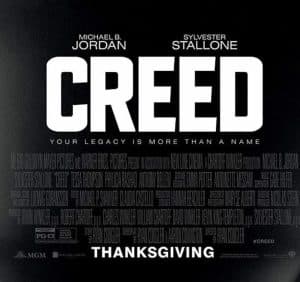
This franchise has come a long way, in a good way, since Creed 1
At first, the idea of Damian going from the jail house yard to a title bout seemed like too big of an ask for my suspension of disbelief. But as I thought about the origins of this series (a heavyweight champ without an opponent picks a palooka and puts on a show), and furthermore the current state of boxing, well, it didn’t seem far-fetched at all.
Let’s face it, if tomorrow the YouTube “boxer” Jake Paul decided he wanted a title shot against a real boxer, he’d get it.
But what really sells you on the idea that Majors could still be a fighting force is Majors himself. Always a fit actor, Majors worked his body into the kind of shape that would shame even the finest Roman statues. He’s also incredibly athletic, and his rage-fueled performance drives the film forward to its exhilarating climax.
Before we get there though, Michael B Jordan, the director, puts in the work to tell a story that’s as much about family and friendship as it is about the big fight. Adonis’ wife Bianca (the luminous Tessa Thompson) has stopped performing to retain her hearing for as long as she can. Her explanation to Damian (before things go sideways) for her move to writing and producing for others is handled with a lovely matter-of-fact delicacy.
One could say the same for Jordan’s tender direction of every scene involving their daughter Amara, who is completely deaf. There is no disease-of-the-week TV movie treatment to their challenges. Jordan simply shows how they live and in no way asks for sorrow or pity.
The plight of Adonis’ mother (a regal Phylicia Rashad), who is in poor health is also handled with grace, and as her condition worsens, the bedside scene between Adonis and her is so moving and powerful that you might (in a good way) feel uncomfortable.
Still, the core of Creed III is the shared trauma between Adonis and Damian, and how their lives turned out so differently. They are flip sides of the same coin, only Damian represents the more deeply scarred half. As their twin hurts are revealed, we are reminded that “there by the grace of god go I.”
I’m not a religious person, but it’s clear that Adonis was the young man touched by grace, whereas Damian’s life was consumed by pain. A pain that results in a sense of jealousy and abandonment over the life that Adonis gets to lead, and the fact that his best friend never checked on him when he went to jail. The genius in this choice is that it doesn’t make the hero a saint, and it doesn’t make the villain a cartoon. Both men have failed in different ways, but one paid a much greater price.

Watch for the ESPN “Cover Story” coverage on SportsCenter
There is a beautiful shot in the film that takes place when Adonis visits Damian before his title fight to wish him well. As he departs, he and Damian are on the opposite side of a cement wall with an open door in front of each of them. They both pause, look at the wall as if they can see through it, right at each other. There is a sense of closeness and division all wrapped up in the same shot. It’s a beautifully subtle but powerful moment that many a more seasoned director would love to claim.
Of course, fans of the Rocky/Creed saga also want the fights to look great. For a first-time director, dialogue driven sequences can often be less difficult than creating visceral action scenes. Once again, Michael B Jordan shows his mettle here. In the first match of the film, Adonis is shown fighting the only man to ever beat him in the ring Ricky Conlan (real-life boxer Tony Bellew in a welcome return from the first Creed film). At first, it seems that Adonis is taking too much punishment, but Jordan’s direction shows how a fighter can take a beating to set up a shot of his own. Conlan’s confidence gets the best of him, and he starts to headhunt his opponent, leaving his midsection open to a counter to the body. As we see Adonis take punches, we notice where he’s looking, right at Conlan’s liver, and when the blow comes, we in the audience understand how Adonis set Conlan up. It’s something I’ve never seen before in a boxing film, but I suspect future directors of films about the sport will be quick to steal from Jordan.
As for the final fight between Adonis and Damian, it is electrifying. The energy of the bout is spectacular and at times so intimate, that you might feel like the fourth person in the ring (after the fighters and the referee). Maybe that was to be expected, but when Jordan makes the artistic choice to clear away all the fans and the announcers, leaving just Adonis and Damian in a ring where the ropes become the bars of a prison cell, well, that’s one hell of a ballsy move. Better yet, it pays off. While these two friends turned enemies may be fighting for title belts, what they are really fighting over is a past that both of them are trying to escape. This is inspired filmmaking.
And yes, all the familiar boxing movie tropes are in play in Creed III. The death of a beloved character, the training sequences, and of course, the fights themselves. But as Roger Ebert once said, “It’s not what a movie is about, it’s how it is about it.” And man, Creed III is all about it.
Hell, I’m not so sure that as the current state of boxing currently sits, with big fights between equally matched combatants being few and far between, that the final bout in Creed III won’t be my choice for fight of the year.
Their scrap is that good, and so is this movie.
















